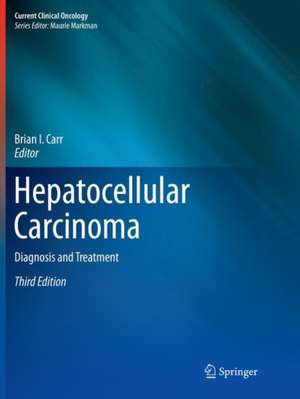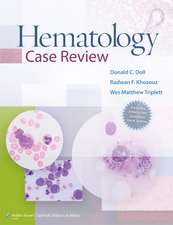Hepatocellular Carcinoma: Diagnosis and Treatment: Current Clinical Oncology
Editat de Brian I. Carren Limba Engleză Paperback – 12 iun 2018
•Hepatocellular carcinoma (HCC) used to be regarded as a rare disease. However, the increasing numbers of chronic HCC carriers in the U.S. and subsequent increased incidences of HCC seen in most large medical centers means that it is no longer an uncommon disease for gastroenterologists or oncologists to encounter and its incidence and epidemiology are changing. During this exciting time in the field of HCC basic science and clinical management, many changes are simultaneously occurring at multiple levels of our understanding and management of the disease. Suddenly, there are several new choices of therapy to offer patients. Hepatocellular Carcinoma, 3rd edition addresses this fast-changing disease and gives the reader a clearer understanding of the many mechanisms involved in carcinogenesis of the liver. This comprehensive and detailed review of how to diagnose and treat hepatocellular carcinoma is written by international leaders in the field, covering both clinical treatment choices and the basic science underlying HCC development. Updated and enhanced from the last edition in 2009, Hepatocellular Carcinoma, 3rd edition features 12 new chapters including discussion of molecular markers, molecular hepatocarcinogenesis, microenvironment, heterogeneity, the new and exciting contributions of immunotherapy, and updates on the major effective hepatitis therapies that will transform HCC incidence and perhaps also the therapy. This cutting-edge text is a vital resource and must-have for today’s hepatologists and medical and surgical oncologists.
"This is a well written text and should be a good reference book for those who see patients with HCC.." - Practical Gastroenterology
"...a useful tool for both physicians and surgeons with a specific interest in the management of patients with HCC." - Digestive and Liver Disease
| Toate formatele și edițiile | Preț | Express |
|---|---|---|
| Paperback (1) | 817.37 lei 6-8 săpt. | |
| Springer International Publishing – 12 iun 2018 | 817.37 lei 6-8 săpt. | |
| Hardback (1) | 1160.99 lei 3-5 săpt. | |
| Springer International Publishing – 7 sep 2016 | 1160.99 lei 3-5 săpt. |
Din seria Current Clinical Oncology
- 5%
 Preț: 1696.75 lei
Preț: 1696.75 lei - 5%
 Preț: 724.70 lei
Preț: 724.70 lei - 5%
 Preț: 1160.99 lei
Preț: 1160.99 lei - 5%
 Preț: 780.45 lei
Preț: 780.45 lei - 5%
 Preț: 1802.48 lei
Preț: 1802.48 lei - 5%
 Preț: 1430.90 lei
Preț: 1430.90 lei - 5%
 Preț: 1342.48 lei
Preț: 1342.48 lei - 5%
 Preț: 1430.72 lei
Preț: 1430.72 lei - 5%
 Preț: 1345.79 lei
Preț: 1345.79 lei - 5%
 Preț: 1614.67 lei
Preț: 1614.67 lei - 5%
 Preț: 1431.09 lei
Preț: 1431.09 lei - 5%
 Preț: 781.17 lei
Preț: 781.17 lei - 5%
 Preț: 1112.54 lei
Preț: 1112.54 lei - 5%
 Preț: 1976.58 lei
Preț: 1976.58 lei - 5%
 Preț: 1106.86 lei
Preț: 1106.86 lei - 5%
 Preț: 1106.33 lei
Preț: 1106.33 lei - 5%
 Preț: 788.32 lei
Preț: 788.32 lei - 5%
 Preț: 1617.62 lei
Preț: 1617.62 lei - 5%
 Preț: 1597.14 lei
Preț: 1597.14 lei - 5%
 Preț: 778.80 lei
Preț: 778.80 lei - 5%
 Preț: 1824.77 lei
Preț: 1824.77 lei - 5%
 Preț: 1119.47 lei
Preț: 1119.47 lei - 5%
 Preț: 1114.71 lei
Preț: 1114.71 lei - 5%
 Preț: 743.69 lei
Preț: 743.69 lei - 5%
 Preț: 1097.91 lei
Preț: 1097.91 lei - 5%
 Preț: 374.20 lei
Preț: 374.20 lei - 5%
 Preț: 1593.27 lei
Preț: 1593.27 lei - 5%
 Preț: 783.04 lei
Preț: 783.04 lei - 5%
 Preț: 1107.94 lei
Preț: 1107.94 lei - 5%
 Preț: 1101.21 lei
Preț: 1101.21 lei - 5%
 Preț: 775.33 lei
Preț: 775.33 lei
Preț: 817.37 lei
Preț vechi: 860.39 lei
-5% Nou
Puncte Express: 1226
Preț estimativ în valută:
156.42€ • 162.38$ • 130.43£
156.42€ • 162.38$ • 130.43£
Carte tipărită la comandă
Livrare economică 24 martie-07 aprilie
Preluare comenzi: 021 569.72.76
Specificații
ISBN-13: 9783319817057
ISBN-10: 3319817051
Pagini: 596
Ilustrații: XXI, 596 p. 129 illus., 80 illus. in color.
Dimensiuni: 210 x 279 mm
Greutate: 1.37 kg
Ediția:Softcover reprint of the original 3rd ed. 2016
Editura: Springer International Publishing
Colecția Springer
Seria Current Clinical Oncology
Locul publicării:Cham, Switzerland
ISBN-10: 3319817051
Pagini: 596
Ilustrații: XXI, 596 p. 129 illus., 80 illus. in color.
Dimensiuni: 210 x 279 mm
Greutate: 1.37 kg
Ediția:Softcover reprint of the original 3rd ed. 2016
Editura: Springer International Publishing
Colecția Springer
Seria Current Clinical Oncology
Locul publicării:Cham, Switzerland
Cuprins
Part A. Causes, Biological and Molecular bases of HCC.- Chapter 1. Epidemiology of Hepatocellular Carcinoma.- Chapter 2. Environmental Carcinogens and Risk for Human Liver Cancer.- Chapter 3. Molecular Mechanisms of Hepatocellular Carcinoma.- Chapter 4. Chemically-Induced Hepatocarcinogenesis.- Chapter 5. Molecular Profiling of Human Hepatocellular Carcinoma.- Chapter 6. Genomic signatures of risk factors and molecular identification of HCC subtypes.- Chapter 7. MicroRNAs and hepatocellular carcinoma.- Chapter 8. Non-tumor prognostic factors in hepatocellular carcinoma.- Chapter 9. Gut microbiota and HCC.- Chapter 10. Hepatocellular Carcinoma as a Paradigm for a Systemic Evolutionary Approach to Cancer.- Chapter 11. HCC and its Microenvironment.- Chapter 12. Circulating tumor cells (Liquid Tumor Biopsy) in hepatocellular carcinoma: biology, methodologies, and clinical implications.- Chapter 13. Role of the immune system in hepatocellular carcinoma: Implications for existingand novel therapies.- Chapter 14. Inter- and Intratumor Heterogeneity in Hepatocellular Carcinoma.- Chapter 15. Systemic inflammation: a new prognostic domain and source of therapeutic targets in hepatocellular carcinoma.- Chapter 16. Hepatocellular Carcinoma Associated with Hepatitis B virus.- Chapter 17. Hepatitis C and Hepatocellular Carcinoma.- Chapter 18. Obesity, NASH and HCC.- Chapter 19. Metabolic Disease and Hepatocellular Carcinoma.- Part B. Diagnosis.- Chapter 20. Pathologic Aspects of Hepatocellular Tumors.- Chapter 21. Protein biomarkers in the management of hepatocellular carcinoma: Novel combinatory approaches.- Chapter 22. Surveillance for hepatocellular carcinoma.- Chapter 23. Use of Imaging Techniques to Screen for Hepatocellular Carcinoma.- Chapter 24. Ultrasound of Hepatocellular Carcinoma: The Important Contribution of Contrast Enhancement.- Chapter 25. MRI for Detection and Evaluation of Hepatocellular Carcinoma.- Chapter 26. Computed Tomography of HCC.- Chapter 27. Clinical features and clinician's diagnostic approach to hepatocellular carcinoma.- Chapter 28. Current HCC Staging systems: their uses and limitations.- Part C. Therapies.- Chapter 29. Percutaneous Ethanol Injection.- Chapter 30. Thermal Ablative Treatments For Hepatocellular Carcinoma.- Chapter 31. Resection of Hepatocellular Carcinoma.- Chapter 32. Liver Transplantation for Hepatocellular Carcinoma.- Chapter 33. Medical Therapy of HCC.- Chapter 34. Targeted therapies for Hepatocellular Carcinoma.- Chapter 35. Radiation Therapy for Hepatocellular Carcinoma.- Chapter 36. Psychosocial Issues in Hepatocellular carcinoma.- Chapter 37. Bringing it all together.
Notă biografică
Dr. Brian I. Carr is Professor of Medical Oncology, Thomas Jefferson University, Philadelphia and Professor, IRCCS de Bellis, National Institute for Digestive Diseases, Castellana Grotte (BA), Italy. Since 1977 he has devoted both his clinical activities and research science efforts to the clinical and scientific study of primary liver cancer (HCC or hepatocellular carcinoma). He has published more than 250 papers in peer-reviewed journals, over 350 abstracts and given a similar number of meeting presentations, written chapters in 36 books and edited 2 books. He is guest editor for the HCC special issue of Seminars in Oncology, Aug, 2012 and has written the chapter on HCC for the last 2 editions of Harrison’s Internal Medicine.
Textul de pe ultima copertă
Hepatocellular carcinoma (HCC) used to be regarded as a rare disease. However, the increasing numbers of chronic HCC carriers in the U.S. and subsequent increased incidences of HCC seen in most large medical centers means that it is no longer an uncommon disease for gastroenterologists or oncologists to encounter and its incidence and epidemiology are changing. During this exciting time in the field of HCC basic science and clinical management, many changes are simultaneously occurring at multiple levels of our understanding and management of the disease. Suddenly, there are several new choices of therapy to offer patients. Hepatocellular Carcinoma, 3rd edition addresses this fast-changing disease and gives the reader a clearer understanding of the many mechanisms involved in carcinogenesis of the liver. This comprehensive and detailed review of how to diagnose and treat hepatocellular carcinoma is written by international leaders in the field, covering both clinical treatment choices and the basic science underlying HCC development. Updated and enhanced from the last edition in 2009, Hepatocellular Carcinoma, 3rd edition features 12 new chapters including discussion of molecular markers, molecular hepatocarcinogenesis, microenvironment, heterogeneity, the new and exciting contributions of immunotherapy, and updates on the major effective hepatitis therapies that will transform HCC indidence and perhaps also the therapy. This cutting-edge text is a vital resource and must-have for today’s hepatologists and medical and surgical oncologists.
"This is a well written text and should be a good reference book for those who see patients with HCC.." - Practical Gastroenterology
"...a useful tool for both physicians and surgeons with a specific interest in the management of patients with HCC." - Digestive and Liver Disease
Caracteristici
Provides the reader with a clear understanding of the many mechanisms involved in carcinogenesis of the liver Comprehensive and detailed review of how to diagnose and treat hepatocellular carcinoma Written by international leaders in the field Updated and enhanced new edition covering topics such as global epidemiology, environmental carcinogens and diet, CT imaging, vascular radiology, and psychological factors Vital resource for today's hepatologists and medical and surgical oncologists Includes supplementary material: sn.pub/extras









